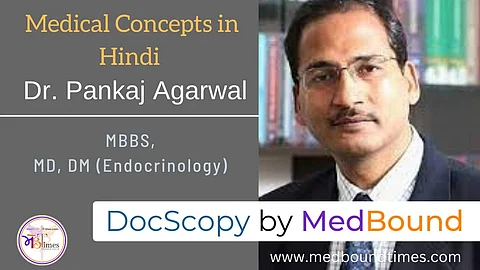Welcome to another session of DocScopy. We present the inspiring story of Dr. Pankaj Agarwal through the conversation with Tanya Singh, Swati Mishra, and Himani Negi from MedBound Times.
Dr. Pankaj Agarwal is not just a doctor but a teacher who has changed the lives of thousands of medical students by introducing Medical Concepts in Hindi. His mission is to make medical concepts clear and easy for those students who are facing some problems in understanding the subject due to linguistic issues. Let's deep dive into Dr. Pankaj Agarwal's journey of helping out medical students who struggle because of the language barrier.
Tanya: What are you currently doing?
आप वर्तमान (Currently) में क्या कर रहे हैं।
Dr. Pankaj: I am a practicing Endocrinologist for the last 24 years and for the last 6 years, I am working towards bringing our modern medical science in easy-to-understand the Hindi language.
Tanya: Tell us something about your life, professional journey, and your areas of interest.
हमें अपने जीवन, पेशेवर यात्रा और अपनी रुचि के क्षेत्रों के बारे में कुछ बताएं।
I did my graduation and post-graduation from Baba Raghav Das Medical College (BRD), Gorakhpur. It mainly caters to nearby rural population and gave me exposure to real India. It helped in developing my sentiments toward my society. I did my super-specialization in Endocrinology from Lala Lajpat Rai Memorial (LLRM) Medical College, Meerut, and post-DM residency from Sanjay Gandhi Postgraduate Institute of Medical Sciences (SGPG IMS), Lucknow. It helped me learn state-of-the-art methodology in my field. In 1999, I started my Hormone Care and Research Center in Ghaziabad and since then I am working in it.
My area of interest at present is focused on Medical Concepts in Hindi (MCH) only but prior to that I enjoyed multiple fields like clinical research wherein I was involved in global clinical studies. Even earlier, my focus was on conducting clinical training programs for general physicians and specialists towards skill enhancement in managing diabetes, hypertension, hypercholesterolemia, and disorders of the thyroid. If I peep into my college days, my areas of interest were music and cultural activities. Music runs in my family and all my daughters have received formal training in Indian classical singing and music.
Tanya: How did this idea of starting MCH come into your mind? What was the inspiration behind this?
एमसीएच शुरू करने का यह विचार आपके दिमाग में कैसे आया? इसके पीछे क्या प्रेरणा थी?
It was not a sudden plan. It is something that I have been thinking about since my college days. In 11th standard, my school was changed. My primary education was in a Hindi medium school and I transferred to an English medium school after my 10th grade. My English wasn't that good at the time. Whenever my teacher asked a question, I used to think of the answer in Hindi first, and then convert the answer into English in my mind. After framing the answer in English, I raised my hand to give the answer. In response to my answer, the entire class began laughing. I asked them why they were laughing. I was told that the answer I had given was already answered by someone else. Ma'am had asked that question 5 minutes ago. The next question had already been asked by Ma'am. Over a period of three to six months, I practiced sentence framing from Hindi to English in my mind.
While in clinical practice, I was always inclined toward conducting training programs for physicians. I observed that while discussing the topic in English, participants used to attend it in an inactive mode and it largely used to be Monologue. But when I started discussing the same programs in our day-to-day language, these passive listeners rapidly turned to become active participants. It strengthened my belief that to reap sweet fruits, education, and training should be in our mother tongue, instead of being in the formal English language. It compelled me to initiate this concept in a mission mode.


